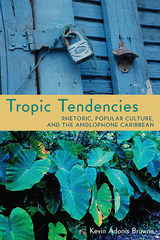2 books about Browne, Kevin Adonis

A Sense of Arrival
Kevin Adonis Browne
Duke University Press, 2024
In A Sense of Arrival, Kevin Adonis Browne blends literary, visual, and material forms to present a narrative of Caribbean Blackness. Arguing that the story of Caribbeanness cannot be told through words alone, Browne interweaves essays, memoir, autotheory, and narrative verse with documentary photography, portraiture, Rorschach blots, and images of his own sculptures and art installations. Browne labels this multimodal approach and rhetorical form “Caribbean Nonfiction,” and he uses it to conceptualize arrival as a theory of being. Arrival is practiced through forms of status, return, belonging, nomadism, self-exile, love, loss, presence, and haunting, each of which expresses the vast complexity and urgency of Caribbeanness. At the same time, arrival emphasizes and extends Caribbean ways of being, knowing, and doing. Throughout, Browne challenges readers to follow the archipelagic sensibilities of the Caribbean to look beyond Black death and apprehend the inherent optimism and beauty of arrival. A singular meditation on the art and process of Caribbeanness, A Sense of Arrival is a statement on how the Black Caribbean self comes to be.
[more]

Tropic Tendencies
Rhetoric, Popular Culture, and the Anglophone Caribbean
Kevin Adonis Browne
University of Pittsburgh Press, 2013
A legacy of slavery, abolition, colonialism, and class struggle has profoundly impacted the people and culture of the Caribbean. In Tropic Tendencies, Kevin Adonis Browne examines the development of an Anglophone Caribbean rhetorical tradition in response to the struggle to make meaning, maintain identity, negotiate across differences, and thrive in light of historical constraints and the need to participate in contemporary global culture.
Browne bases his study on the concept of the “Caribbean carnivalesque” as the formative ethos driving cultural and rhetorical production in the region and beyond it. He finds that carnivalesque discourse operates as a “continuum of discursive substantiation” that increases the probability of achieving desired outcomes for both the rhetor and the audience. Browne also views the symbolic and material interplay of the masque and its widespread use to amplify efforts of resistance, assertion, and liberation.
Browne analyzes rhetorical modes and strategies in a variety of forms, including music, dance, folklore, performance, sermons, fiction, poetry, photography, and digital media. He introduces chantwells, calypsonians, old talkers, jamettes, stickfighters, badjohns, and others as exemplary purveyors of Caribbean rhetoric and deconstructs their rhetorical displays. From novels by Earl Lovelace, he also extracts thematic references to kalinda, limbo, and dragon dances that demonstrate the author’s claim of an active vernacular sensibility. He then investigates the re-creation and reinvention of the carnivalesque in cyber culture, demonstrating the ways participants both flaunt and defy normative ideas of “Caribbeanness” in online and macro environments.
Browne bases his study on the concept of the “Caribbean carnivalesque” as the formative ethos driving cultural and rhetorical production in the region and beyond it. He finds that carnivalesque discourse operates as a “continuum of discursive substantiation” that increases the probability of achieving desired outcomes for both the rhetor and the audience. Browne also views the symbolic and material interplay of the masque and its widespread use to amplify efforts of resistance, assertion, and liberation.
Browne analyzes rhetorical modes and strategies in a variety of forms, including music, dance, folklore, performance, sermons, fiction, poetry, photography, and digital media. He introduces chantwells, calypsonians, old talkers, jamettes, stickfighters, badjohns, and others as exemplary purveyors of Caribbean rhetoric and deconstructs their rhetorical displays. From novels by Earl Lovelace, he also extracts thematic references to kalinda, limbo, and dragon dances that demonstrate the author’s claim of an active vernacular sensibility. He then investigates the re-creation and reinvention of the carnivalesque in cyber culture, demonstrating the ways participants both flaunt and defy normative ideas of “Caribbeanness” in online and macro environments.
[more]
READERS
Browse our collection.
PUBLISHERS
See BiblioVault's publisher services.
STUDENT SERVICES
Files for college accessibility offices.
UChicago Accessibility Resources
home | accessibility | search | about | contact us
BiblioVault ® 2001 - 2024
The University of Chicago Press









